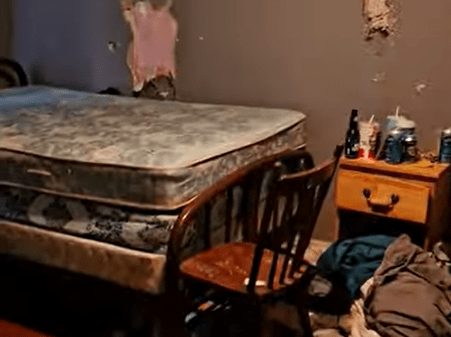Jillian Smith and Shawn Douglas, a couple from Yarmouth, Nova Scotia, are grappling with the devastating aftermath of a three-month tenancy that has left their rental property in ruins. What they envisioned as a compassionate venture to provide affordable housing has transformed into a financial and emotional nightmare, leaving them questioning the efficacy of current landlord-tenant legislation and the future of their involvement in the rental market. The state of their property, they say, resembles a scene ripped from a horror film, a stark contrast to the welcoming haven they intended it to be. The extent of the damage, ranging from mountains of beer cans and rotting food to shattered windows and gaping holes in the walls and ceilings, far surpasses anything they could have anticipated. This destruction represents not only a significant financial setback but also a profound disappointment in their attempt to provide a helping hand to those in need.
The couple’s ordeal began with what seemed like a promising tenant referral from Shyft House, a local non-profit organization dedicated to assisting homeless youth. The timing coincided with the sale of their property, but driven by a desire to accommodate a long-term tenant residing in the downstairs unit, they postponed the handover of the property to the new owners. This decision, intended as a gesture of goodwill, inadvertently paved the way for the ensuing chaos. Initially, the new tenancy proceeded smoothly. However, after the first month, the situation deteriorated rapidly. The tenant ceased paying rent, and the property became a frequent site of police interventions. The escalating problems led to a barrage of distressing phone calls from their realtor, lawyer, and the RCMP, each call painting a grimmer picture of the unfolding devastation.
The initial reports described significant damage to the front of the house, including broken windows and vandalized walls. As the situation spiraled out of control, Smith and Douglas found themselves trapped in a frustratingly slow eviction process. Despite the severity of the situation, the legal procedures required to remove the tenant proved to be time-consuming and cumbersome. While they acknowledge the helpfulness of the RCMP and the Nova Scotia Residential Tenancies Board, they feel the current legislation offers insufficient protection to landlords, particularly in emergency situations like theirs. The delays and bureaucratic hurdles they encountered underscore their concerns about the imbalance in the system.
The financial burden of the extensive repairs, estimated to be at least $5,000, adds another layer of difficulty to their predicament. This unexpected expense represents a significant portion of the couple’s investment in the property and further underscores the financial risks associated with being a landlord. What makes this situation even more disheartening for Smith and Douglas is the erosion of their initial motivation for becoming landlords. Their aim was to provide affordable housing to vulnerable populations, including new Canadians, retirees, and individuals with special needs. They offered below-market rent and covered utilities, striving to create a supportive and accessible living environment. This experience, however, has left them deeply disillusioned and questioning whether they can continue to offer such assistance in the future.
The couple’s story highlights a broader concern about the potential impact of such experiences on the availability of affordable housing. They fear that the difficulties they faced, coupled with the perceived lack of protection for landlords, may deter others from offering affordable units. This could lead to a shrinking pool of accessible housing options, particularly for those who rely on lower rents and supportive landlords. The increased financial risks and the emotional toll of dealing with destructive tenants can make it less appealing for landlords to offer affordable housing, potentially exacerbating the existing housing crisis.
In the wake of this devastating experience, Smith and Douglas have decided to withdraw from the rental market. They lament the irony of the situation, recognizing that the damage caused by their former tenant will likely force future landlords to raise rents to compensate for the increased risk. This, in turn, will further limit the availability of affordable housing options for those in need. Their story serves as a cautionary tale, highlighting the challenges faced by landlords who strive to provide affordable housing and raising questions about the effectiveness of current legislation in protecting their interests. While Shyft House declined to comment on the situation, the couple’s experience remains a stark reminder of the complexities and potential pitfalls of the rental market.

